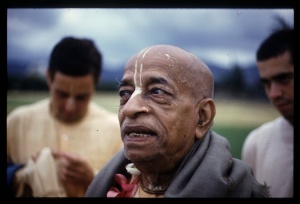BG 2.19: Difference between revisions
m (1 revision(s)) |
(Vanibot #0054 edit - transform synonyms into clickable links, which search similar occurrences) |
||
| (One intermediate revision by one other user not shown) | |||
| Line 1: | Line 1: | ||
{{ | [[Category:Bhagavad-gita As It Is (1983+) - Chapter 02]] | ||
<div style="float:left">'''[[Bhagavad-gita As It Is (1983+)]] - [[BG 2 (1983+)|Chapter 2: Contents of the Gita Summarized]]'''</div> | |||
<div style="float:right">[[File:Go-previous.png|link=BG 2.18]] '''[[BG 2.18]] - [[BG 2.20]]''' [[File:Go-next.png|link=BG 2.20]]</div> | |||
{{CompareVersions|BG|2.19|BG 1972|BG 1983+}} | |||
{{RandomImage}} | |||
==== TEXT 19 ==== | ==== TEXT 19 ==== | ||
<div class="devanagari"> | |||
:य एनं वेत्ति हन्तारं यश्चैनं मन्यते हतम् । | |||
:उभौ तौ न विजानीतो नायं हन्ति न हन्यते ॥१९॥ | |||
</div> | |||
<div | <div class="verse"> | ||
:ya enaṁ vetti hantāraṁ | |||
:yaś cainaṁ manyate hatam | |||
:ubhau tau na vijānīto | |||
:nāyaṁ hanti na hanyate | |||
</div> | </div> | ||
==== SYNONYMS ==== | ==== SYNONYMS ==== | ||
<div class="synonyms"> | |||
<div | ''[//vanipedia.org/wiki/Special:VaniSearch?s=yaḥ&tab=syno_o&ds=1 yaḥ]'' — anyone who; ''[//vanipedia.org/wiki/Special:VaniSearch?s=enam&tab=syno_o&ds=1 enam]'' — this; ''[//vanipedia.org/wiki/Special:VaniSearch?s=vetti&tab=syno_o&ds=1 vetti]'' — knows; ''[//vanipedia.org/wiki/Special:VaniSearch?s=hantāram&tab=syno_o&ds=1 hantāram]'' — the killer; ''[//vanipedia.org/wiki/Special:VaniSearch?s=yaḥ&tab=syno_o&ds=1 yaḥ]'' — anyone who; ''[//vanipedia.org/wiki/Special:VaniSearch?s=ca&tab=syno_o&ds=1 ca]'' — also; ''[//vanipedia.org/wiki/Special:VaniSearch?s=enam&tab=syno_o&ds=1 enam]'' — this; ''[//vanipedia.org/wiki/Special:VaniSearch?s=manyate&tab=syno_o&ds=1 manyate]'' — thinks; ''[//vanipedia.org/wiki/Special:VaniSearch?s=hatam&tab=syno_o&ds=1 hatam]'' — killed; ''[//vanipedia.org/wiki/Special:VaniSearch?s=ubhau&tab=syno_o&ds=1 ubhau]'' — both; ''[//vanipedia.org/wiki/Special:VaniSearch?s=tau&tab=syno_o&ds=1 tau]'' — they; ''[//vanipedia.org/wiki/Special:VaniSearch?s=na&tab=syno_o&ds=1 na]'' — never; ''[//vanipedia.org/wiki/Special:VaniSearch?s=vijānītaḥ&tab=syno_o&ds=1 vijānītaḥ]'' — are in knowledge; ''[//vanipedia.org/wiki/Special:VaniSearch?s=na&tab=syno_o&ds=1 na]'' — never; ''[//vanipedia.org/wiki/Special:VaniSearch?s=ayam&tab=syno_o&ds=1 ayam]'' — this; ''[//vanipedia.org/wiki/Special:VaniSearch?s=hanti&tab=syno_o&ds=1 hanti]'' — kills; ''[//vanipedia.org/wiki/Special:VaniSearch?s=na&tab=syno_o&ds=1 na]'' — nor; ''[//vanipedia.org/wiki/Special:VaniSearch?s=hanyate&tab=syno_o&ds=1 hanyate]'' — is killed. | ||
</div> | </div> | ||
==== TRANSLATION ==== | ==== TRANSLATION ==== | ||
<div class="translation"> | |||
<div | |||
Neither he who thinks the living entity the slayer nor he who thinks it slain is in knowledge, for the self slays not nor is slain. | Neither he who thinks the living entity the slayer nor he who thinks it slain is in knowledge, for the self slays not nor is slain. | ||
</div> | </div> | ||
==== PURPORT ==== | |||
= | <div class="purport"> | ||
When an embodied living entity is hurt by fatal weapons, it is to be known that the living entity within the body is not killed. The spirit soul is so small that it is impossible to kill him by any material weapon, as will be evident from subsequent verses. Nor is the living entity killable, because of his spiritual constitution. What is killed, or is supposed to be killed, is the body only. This, however, does not at all encourage killing of the body. The Vedic injunction is ''mā hiṁsyāt sarvā bhūtāni:'' '''([[BG 9.4]])''' never commit violence to anyone. Nor does understanding that the living entity is not killed encourage animal slaughter. Killing the body of anyone without authority is abominable and is punishable by the law of the state as well as by the law of the Lord. Arjuna, however, is being engaged in killing for the principle of religion, and not whimsically. | |||
</div> | |||
<div | <div style="float:right; clear:both;">[[File:Go-previous.png|link=BG 2.18]] '''[[BG 2.18]] - [[BG 2.20]]''' [[File:Go-next.png|link=BG 2.20]]</div> | ||
__NOTOC__ | |||
</div> | __NOEDITSECTION__ | ||
__NOTOC__ | |||
Latest revision as of 15:25, 17 February 2024

A.C. Bhaktivedanta Swami Prabhupada
TEXT 19
- य एनं वेत्ति हन्तारं यश्चैनं मन्यते हतम् ।
- उभौ तौ न विजानीतो नायं हन्ति न हन्यते ॥१९॥
- ya enaṁ vetti hantāraṁ
- yaś cainaṁ manyate hatam
- ubhau tau na vijānīto
- nāyaṁ hanti na hanyate
SYNONYMS
yaḥ — anyone who; enam — this; vetti — knows; hantāram — the killer; yaḥ — anyone who; ca — also; enam — this; manyate — thinks; hatam — killed; ubhau — both; tau — they; na — never; vijānītaḥ — are in knowledge; na — never; ayam — this; hanti — kills; na — nor; hanyate — is killed.
TRANSLATION
Neither he who thinks the living entity the slayer nor he who thinks it slain is in knowledge, for the self slays not nor is slain.
PURPORT
When an embodied living entity is hurt by fatal weapons, it is to be known that the living entity within the body is not killed. The spirit soul is so small that it is impossible to kill him by any material weapon, as will be evident from subsequent verses. Nor is the living entity killable, because of his spiritual constitution. What is killed, or is supposed to be killed, is the body only. This, however, does not at all encourage killing of the body. The Vedic injunction is mā hiṁsyāt sarvā bhūtāni: (BG 9.4) never commit violence to anyone. Nor does understanding that the living entity is not killed encourage animal slaughter. Killing the body of anyone without authority is abominable and is punishable by the law of the state as well as by the law of the Lord. Arjuna, however, is being engaged in killing for the principle of religion, and not whimsically.